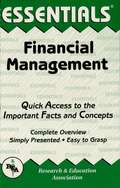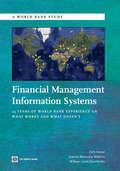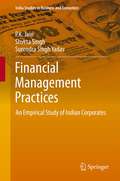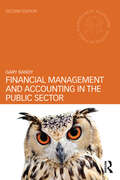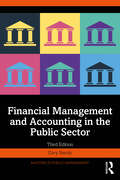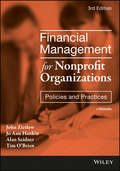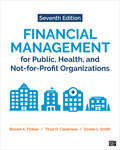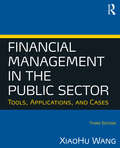- Table View
- List View
Financial Mail on Sunday Guide to Investment
by Andrew LeachA unique, truly comprehensive guide to all aspects of investment, that provides a wealth of expert advice and information in clear and jargon-free language that everyone will understand. Part I - getting startedWhat are shares? How to buy and sell shares and what to expect in terms of returns? How to find a stockbroker that's right for you. How much money should you invest directly in shares? Lower-risk investments in bonds, gilts, and unit and investment trusts. Risk - and achieving the balance between risk and reward. Part II - understanding the jargonWhat do company results show? Some key financial yardsticks and how to calculate them. Key accounting issues and how the books can be cooked. Financial ratios and what they tell you. Part III - for the more experienced investorRisk and the psychology of investment. Some theories about markets and stock market investment. Key investment styles and the gurus of investment. Different types of investment opportunities. Futures and options. Commodities.
Financial Management Essentials
by Musa EssayyadREA's Essentials provide quick and easy access to critical information in a variety of different fields, ranging from the most basic to the most advanced. As its name implies, these concise, comprehensive study guides summarize the essentials of the field covered. Essentials are helpful when preparing for exams, doing homework and will remain a lasting reference source for students, teachers, and professionals. Financial Management includes the finance function, business organization, financial statements, depreciation and cash flow, financial statement analysis, financial planning, operating and financial leverage, time value of money, risk and return, valuation, capital budgeting, cost of capital, capital structure, cash and marketable securities, accounts receivables and inventories, and financing smaller firms and startups.
Financial Management For Public, Health, And Not-for-profit Organizations
by Steven A. Finkler Thad Calabrese Robert Purtell Daniel L. SmithOne of the few texts that addresses financial and managerial accounting within the three major areas of the public sector. Financial Management for Public, Health, and Not-for-Profit provides the fundamentals of financial management for those pursuing careers within the public, health and not-for-profit fields. With a unique presentation that explains the rules specific to the public sector, this book outlines the framework for readers to access and apply financial information more effectively.
Financial Management Information Systems
by The World BankSince 1984, the World Bank has financed 87 Financial Management Information System (FMIS) projects in 51 countries totaling over US $2.2 billion, of which US $938 million was for FMIS related information and communication technology (ICT) solutions. This study presents the World Bank's experience with these investment operations to share the achievements and challenges observed, and provide guidance for improving the performance of future projects. The report is structured according to four overarching questions: * What historical patterns emerge from World Bank financed Treasury/FMIS projects? This includes an analysis of project scope, cost, duration, design, objectives, and ICT solutions, among other aspects. * How have such projects performed according to various criteria? * What are the key factors that contribute to the success and failure of projects? * What have we learned that could be useful for future projects? The findings of this report are primarily based on the 2010 FMIS Database, which includes 55 closed and 32 active FMIS projects implemented between 1984 and 2010 (7 pipeline projects are also analyzed in some sections). The data was gathered primarily from internal World Bank documents and sources, and complemented with interviews with project teams. The Database contains a rich set of operational data and performance ratings for the benefit of the World Bank task teams, government officials and other specialists involved in FMIS projects. Compared to the previously prepared draft FMIS report in 2003 (Dorotinsky and Cho), this study is based on a broader set of projects and documents in analyzing the performance and outputs of the FMIS projects, and presents more in-depth analysis of the success and failure factors. Based on the findings of the current study, the interventions of the World Bank in the design and implementation of FMIS solutions have been reasonably successful in most countries.
Financial Management Practices
by Shveta Singh P. K. Jain Surendra Singh YadavFinancial management practices are likely to have a marked effect on the financial performance of a corporate enterprise. Therefore, sound financial decisions/practices can contribute towards meeting the desired objective of having profitable operations. This subject assumes paramount significance in view of the present dynamic and turbulent business environment, which has produced more intense competition and smaller profit margins across the world. In this context, the financial management practices of the corporates in India, a country with a vast potential for economic growth, can offer valuable insights. The present study explores whether there has been a major change in the financial performance (measured in terms of profitability) and financial policies/decisions of the sample companies over a fixed period (2000-2001 to 2010-2011), with a special focus on pre and post-recession analysis. It delves deeper into current research areas such as zero working capital, real options in capital budgeting, pecking order in capital structures, and clause 49 as reflected in the financial management decisions of sample companies, and provides a broader perspective by identifying trends (if any) in certain aspects of financial decision-making over the past two decades. A comprehensive study, covering all the major aspects of financial management practices, also contains an inter-sectoral study (among the sample companies) and develops an index of professionalism in financial management based on the practices of the sample companies. The book is primarily targeted at teachers/students of finance, management, commerce, accounting and related professional disciplines/fields. Practitioners/professionals will find it an invaluable text that helps guide them to better decision-making.
Financial Management Practices in India
by Sandeep GoelEfficient financial management is the essence of business. This book analyses and evaluates core financial management practices of corporate enterprises in India across diverse sectors including realty, FMCG, pharmaceutical, automobile, IT, chemical and BPO sectors. It emphasizes the importance of the integrated process of capital investments, financing policy, working capital management and dividend distribution for shareholders for a developing economy as India. It further highlights the need for financial viability both in totality and segmental performance. The volume also offers a comparative study of the practices of the companies in different sectors to allow a better appreciation of the issues and challenges regarding management of finances. Rich in case studies, this book will be an indispensable resource for scholars, teachers and students of financial management, business economics as also corporate practitioners.
Financial Management Revised Edition
by ElearnStuck for ideas, inspiration or just want to work differently? Management Extra brings all the best management thinking together in one package. The books are practical and well structured to provide an in depth treatment of these management topics. Titles in the series: * Business Environment * Change Management * Development for High Performance * Effective Communications * Financial Management * Information and Knowledge Management * Leadership and Management in Organisations * Leading Teams * Making Sense of Data and Information * Managing Markets and Customers * Managing for Results * Managing Health, Safety and Working Environment * Managing Legal and Ethical Principles * Managing Yourself * Positive Working Relationships * Project Management * Quality and Operations Management * Reaching Your Goals Through Innovation * Recruitment and Selection * Reputation Management The series fuses key theories and concepts with applied activities to help managers examine how they work in practice. The books are created with individuals in mind. They are designed to help you improve your management skills. Management Extra can also be used in conjunction with management programmes of study aligned to standards. Each of the books has case studies, self assessments and activities all underpinned by knowledge and understanding of the frameworks and techniques required to improve performance. Management Extra provides managers and trainers with a handbook for action and development. "You found it – what a find! A practical resource packed with all the relevant theory and suggested activities to support your professional development. An essential resource to have at your fingertips, jump in and enjoy." --Russell Jeans, Learning and Development Manager, ntl "All the essential concepts are here, presented in an easily digestible format with lots of up to date case studies and references – but, most importantly, with plenty of thought provoking activities and self-diagnostic exercises to make the learning personal and transferable." --Peter Manning, Head of Training & Development, News International Newspapers Ltd
Financial Management Strategies for Hospitals and Healthcare Organizations: Tools, Techniques, Checklists and Case Studies
by David Edward Marcinko Hope Rachel HeticoIn this book, a world-class editorial advisory board and an independent team of contributors draw on their experience in operations, leadership, and Lean managerial decision making to share helpful insights on the valuation of hospitals in today‘s changing reimbursement and regulatory environments.Using language that is easy to understand, Financia
Financial Management and Accounting in the Public Sector (Masters in Public Management)
by Gary BandyThe impact of the global financial crisis on government funds has been significant, with squeezed budgets having to satisfy ever-increasing demands for public services. Managers working in the public sector are confronted daily with targets and demands that are often set in confusing accounting and financial language. In Financial Management and Accounting in the Public Sector, Gary Bandy employs a clear and concise narrative to introduce the core concepts of accounting and financial management in the public sector and how to deliver services that represent value for money. This second edition has been revised and updated throughout, offering: an increased focus on post-crisis austerity more international examples of public financial management greater coverage of governance, accountability and risk management With a glossary of terms to help managers understand and be understood by accountants, as well as learning objectives, case studies and discussion questions, this practical textbook will help students of public management and administration to understand the financial and accounting aspects of managing public services.
Financial Management and Accounting in the Public Sector (Masters in Public Management)
by Gary BandyThe importance of public financial management for the health and wellbeing of citizens became dramatically apparent as governments sought to respond to the coronavirus pandemic in 2020. Now, governments and other public sector organizations face the challenge of recovering from the pandemic whilst also seeking to achieve Sustainable Development Goals, with squeezed budgets and ever-increasing demands for public services. Public sector managers are confronted daily with targets and demands that are often set in confusing accounting and financial language. In Financial Management and Accounting in the Public Sector, Gary Bandy employs a clear and concise narrative to introduce the core concepts of public financial management to help those managers to deliver programmes, projects and services that are value for money. As the author puts it, managing public money is an art, not a science. This third edition has been revised and updated throughout, offering: a structure that is more clearly linked to the stages of the public financial management cycle greater coverage of transparency and accountability issues a broader view of public procurement to include goods, works and services and effective contract management; and an increased focus on public spending in the context of a post-COVID environment. With a glossary of terms to help managers understand and be understood by accountants, as well as learning objectives, discussion questions and exercises, this practical textbook will help students of public management and administration to understand the financial and accounting aspects of managing public services.
Financial Management and Control in Higher Education
by Eric Morgan Malcolm ProwleFull of tried and tested case material, examples and useful illustrations, this book considers the latest developments and covers all levels of financial management from the structure of the management of institutions right down to the course level and managing budgets.
Financial Management and Corporate Governance from the Feminist Ethics of Care Perspective
by Desi Adhariani Nick Sciulli Robert CliftThis book investigates how businesses can adapt their executive and fiscal practices to adopt an ethical, equal-opportunity approach. The authors demonstrate how corporations can create sustainable work environments that embrace feminist care ethics and ground their research in a strong theoretical discussion of this relatively new framework. The discussion has a multidisciplinary outlook and explores how the concept of care ethics might be successfully applied to various professional contexts. Later chapters present findings from an empirical case study conducted in Australia and use both qualitative and quantitative methods to analyse the potential power of a feminist care of ethics approach within commercial and corporate management.
Financial Management and Corporate Governance from the Feminist Ethics of Care Perspective
by Desi Adhariani Nick Sciulli Robert CliftThis book investigates how businesses can adapt their executive and fiscal practices to adopt an ethical, equal-opportunity approach. The authors demonstrate how corporations can create sustainable work environments that embrace feminist care ethics and ground their research in a strong theoretical discussion of this relatively new framework. The discussion has a multidisciplinary outlook and explores how the concept of care ethics might be successfully applied to various professional contexts. Later chapters present findings from an empirical case study conducted in Australia and use both qualitative and quantitative methods to analyse the potential power of a feminist care of ethics approach within commercial and corporate management.
Financial Management for Nonprofit Human Service Organizations (Second Edition )
by Raymond Sanchez MayersThis book is an update of the previous edition, formerly titled Financial Management for Nonprofit Human Service Agencies. This new and expanded edition provides the critical knowledge needed to communicate with the "experts." The central organizing theme of this book is the acquisition, distribution, and reporting of agency resources within a systems framework. New topics include fees for services, purchase of service contracting, breakeven analysis for costing services and activities, third-party payments, internet resources, and a glossary.
Financial Management for Nonprofit Organizations
by Jo Ann Hankin John Zietlow Alan G. SeidnerIndispensable for all types and sizes of nonprofit organizations, this important book imparts a clear sense of the technical expertise and proficiency needed as a nonprofit financial officer and includes real-world case studies, checklists, tables, and sample policies to clarify and explain financial concepts.
Financial Management for Nonprofit Organizations: Policies and Practices (Wiley Nonprofit Law, Finance And Management Ser. #109)
by Tim O'Brien Jo Ann Hankin John Zietlow Alan SeidnerEssential tools and guidance for effective nonprofit financial management Financial Management for Nonprofit Organizations provides students, professionals, and board members with a comprehensive reference for the field. Identifying key objectives and exploring current practices, this book offers practical guidance on all major aspects of nonprofit financial management. As nonprofit organizations fall under ever-increasing scrutiny and accountability, this book provides the essential knowledge and tools professional need to maintain a strong financial management system while serving the organization’s stated mission. Financial management, cash flow, and financial sustainability are perennial issues, and this book highlights the concepts, skills, and tools that help organizations address those issues. Clear guidance on analytics, reporting, investing, risk management, and more comprise a singular reference that nonprofit finance and accounting professionals and board members should keep within arm’s reach. Updated to reflect the post-recession reality and outlook for nonprofits, this new edition includes new examples, expanded tax-exempt financing material, and recession analysis that informs strategy going forward. Articulate the proper primary financial objective, target liquidity, and how it ensures financial health and sustainability Understand nonprofit financial practices, processes, and objectives Manage your organization’s resources in the context of its mission Delve into smart investing and risk management best practices Manage liquidity, reporting, cash and operating budgets, debt and other liabilities, IP, legal risk, internal controls and more Craft appropriate financial policies Although the U.S. economy has recovered, recovery has not addressed the systemic and perpetual funding challenges nonprofits face year after year. Despite positive indicators, many organizations remain hampered by pursuit of the wrong primary financial objective, insufficient funding and a lack of investment in long-term sustainability; in this climate, financial managers must stay up-to-date with the latest tools, practices, and regulations in order to serve their organization’s interests. Financial Management for Nonprofit Organizations provides clear, in-depth reference and strategy for navigating the expanding financial management function.
Financial Management for Public, Health, and Not-for-Profit Organizations
by Steven A. Finkler Daniel L. Smith Thad D. CalabreseReflecting recent changes in accounting standards, this Seventh Edition of Financial Management for Public, Health, and Not-for-Profit Organizations provides a comprehensive yet practical introduction to the financial decision-making and management skills required of students and practitioners in the public, health, and not-for-profit sectors. Assuming that readers have no prior training in financial management, the authors artfully combine the principles, theory, and analytics of accounting and finance. In every chapter, a wide range of exercises, case studies, and problems help students develop strong financial assessment and judgment proficiencies while reinforcing the essential mechanics of accounting.
Financial Management for Public, Health, and Not-for-Profit Organizations
by Steven A. Finkler Daniel L. Smith Thad D. CalabreseReflecting recent changes in accounting standards, this Seventh Edition of Financial Management for Public, Health, and Not-for-Profit Organizations provides a comprehensive yet practical introduction to the financial decision-making and management skills required of students and practitioners in the public, health, and not-for-profit sectors. Assuming that readers have no prior training in financial management, the authors artfully combine the principles, theory, and analytics of accounting and finance. In every chapter, a wide range of exercises, case studies, and problems help students develop strong financial assessment and judgment proficiencies while reinforcing the essential mechanics of accounting.
Financial Management for Public, Health, and Not-for-Profit Organizations
by Steven A. Finkler Daniel L. Smith Thad D. CalabreseReflecting recent changes in accounting standards, this Eighth Edition of Financial Management for Public, Health, and Not-for-Profit Organizations provides a comprehensive yet practical introduction to the financial decision-making and management skills required of students and practitioners in the public, health, and not-for-profit sectors. Assuming that readers have no prior training in financial management, the authors artfully combine the principles, theory, and analytics of accounting and finance. In every chapter, a wide range of exercises, case studies, and problems help students develop strong financial assessment and judgment proficiencies while reinforcing the essential mechanics of accounting.
Financial Management for Public, Health, and Not-for-Profit Organizations
by Steven A. Finkler Daniel L. Smith Thad D. CalabreseReflecting recent changes in accounting standards, this Eighth Edition of Financial Management for Public, Health, and Not-for-Profit Organizations provides a comprehensive yet practical introduction to the financial decision-making and management skills required of students and practitioners in the public, health, and not-for-profit sectors. Assuming that readers have no prior training in financial management, the authors artfully combine the principles, theory, and analytics of accounting and finance. In every chapter, a wide range of exercises, case studies, and problems help students develop strong financial assessment and judgment proficiencies while reinforcing the essential mechanics of accounting.
Financial Management for Technology Start-Ups: A Handbook for Growth
by Professor Alnoor BhimaniAll start-up businesses must be founded on product expertise, a grasp of digitisation, and being aware of market forces. Tech start-ups also need a unique understanding of accounting to succeed, knowledge which is required to power their more innovative business models, and the ways of working that drive technology-based businesses. Unlike traditional accounting manuals or those aimed more generally at small business operators, Financial Management for Technology Start-Ups concentrates on what is important in financial terms for technology-based and innovation focused entrepreneurial businesses.Featuring a simple yet effective 'Start-Up Financial Control Loop' and 'Tech Start-Up Tracker,' Financial Management for Technology Start-Ups offers a complete and must-have financial toolkit for launching and managing a tech start-up. The book covers all relevant facets of accounting and finance not covered by any other publication by using straight-forward language, extensive practical illustrations and case studies to demonstrate the financial understanding that has become essential to technology and innovation-based start-ups.
Financial Management for Technology Start-Ups: How to Power Growth, Track Performance and Drive Innovation
by Alnoor BhimaniMore than a third of start-ups fail due to founders having a poor understanding of financial management. Become financially savvy with this easy to understand guide and learn how to effectively grow your business, communicate with investors and progress to the next level.Start-ups face many challenges but managing the finances does not need to be one. Financial Management for Technology Start-Ups offers a complete financial toolkit on how to use this area of your business to your advantage. This book contains invaluable tools and insights designed specifically for tech start-ups, with a concentrated focus on what is important in financial terms for technology-based and innovation focused entrepreneurial businesses.The fully updated second edition offers greater analysis of financial statements directly from real-world start-ups, charts the success of businesses that went from start-up to scale-up with all new case studies and covers new digital technologies, emerging opportunities in the ecosystem, developing markets and much more. For entrepreneurs and tech innovators, this is a must-have book to help take your idea from concept to company with clear and effective financial insights.
Financial Management in Museums: Theory, Practice, and Context
by Rachel Shane Yuha Jung Jaleesa Renee WellsFinancial Management in Museums considers sustainable and innovative solutions to current museum financial challenges by analyzing the many changes and pressures affecting the museum field.Presenting diverse perspectives from a range of authors around the world, the book shares and compares different funding models and methods of museum financial management. Arguing that museums need to be more effective in obtaining and managing financial resources, the volume also demonstrates how innovative and sustainable financial management strategies and structures can allow museums to respond to societal pressures and issues in a more effective way. It also demonstrates that museums must allocate resources responsibly to fulfill their goals of justice, equity, inclusion, and accessibility. The theoretical and practical contributions within the volume cover a comprehensive range of topics, including foundational concepts, revenue, expenses, budgeting, financial leadership, strategic planning, mission-based investment strategies and alternative revenue strategies.Financial Management in Museums focuses on the unique financial needs and structures of museums, while also considering important lessons from adjacent sectors. It will be essential reading for students and academics engaged in the study of museums, arts and cultural management and business. The book will also be useful to museum professionals working around the world.
Financial Management in the Public Sector: Tools, Applications and Cases
by Xiaohu (Shawn) WangThe new edition of this popular book provides a step-by-step guide on how to use financial management and budgeting tools in the public sector. The book features a practical, case-study approach, and includes plentiful exercises and examples. It is designed as a textbook for courses on public financial management or public budgeting that focus on the application of budgeting and financial management tools. Public service professionals will also benefit from this handy primer.
Financial Management in the Sport Industry
by Matthew T. Brown Daniel A. Rascher Mark S. Nagel Chad D. McEvoyNow in a fully revised and updated third edition, this essential textbook introduces the fundamentals of sport finance and sound financial management in the sport industry. It is still the only textbook to explain every aspect of finance from the perspective of the sport management practitioner, explaining key concepts and showing how to apply them in practice in the context of sport. The text begins by covering finance basics and the tools and techniques of financial quantification, using industry examples to apply the principles of financial management to sport. It then goes further, to show how financial management works specifically in the sport industry. Discussions include interpreting financial statements, debt and equity financing, capital budgeting, facility financing, economic impact, risk and return, time value of money, and more. The final part of the book examines financial management in four sectors of the industry: public sector sport, collegiate athletics, professional sport, and international sport. It provides an in-depth analysis of the mechanics of financial management within each of these sport sectors. Useful features, such as sidebars, concept checks, practice problems, case analysis and case questions will help students engage more deeply with financial techniques and encourage problem-solving skills. This new edition includes a completely new chapter on international sport, reflecting the globalized nature of the modern sport industry, as well expanded coverage of current issues such as digital media finance, recent legal cases affecting collegiate sport, and the central importance of collective bargaining. Financial Management in the Sport Industry is an essential textbook for any undergraduate or postgraduate course in sport finance, and an invaluable supplement to any course in sport business or sport management. It is also an important reference for all sport management practitioners looking to improve their understanding of finance. The book is accompanied by updated and expanded ancillary materials, including an instructor’s manual, PowerPoint slides, and an image bank.

